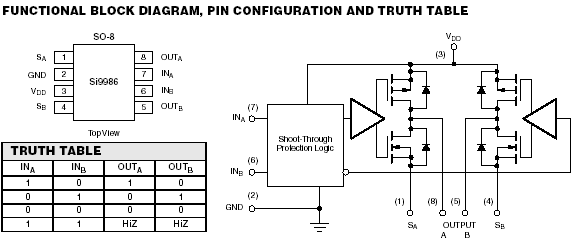 Having half a mind on the challenge of half-size micromouse, I was looking at some information on the megabitty controller. As supplied, it may well have enough features to make a micromouse controller but that wasn’t what caught my eye. On the board are two full-bridge motor drivers. While looking for data on these, I came across the slightly more flexible Si9986, also by Vishay…
Having half a mind on the challenge of half-size micromouse, I was looking at some information on the megabitty controller. As supplied, it may well have enough features to make a micromouse controller but that wasn’t what caught my eye. On the board are two full-bridge motor drivers. While looking for data on these, I came across the slightly more flexible Si9986, also by Vishay…
I have simply stolen from the datasheet for the description:
The Si9986 is an integrated, buffered H-bridge with TTL compatible inputs and the capability of delivering a continuous 1.0 A at VDD = 12 V (room temperature) at switching rates up to 200 kHz. Internal logic prevents the upper and lower outputs of either half-bridge from being turned on simultaneously. Unique input codes allow both outputs to be forced low (for braking) or forced to a high impedance level.
The Si9986 is available in 8-pin SOIC packages, specified to operate over a voltage range of 3.8 V to 13.2 V, and the commercial temperature range of 0 to 70 °C (C suffix).
This looks ideal for a small robot. No figure is given for RDSon but the chip is rated for a continuous 1.0A at room temperature. You can expect it to get pretty hot though. If you don’t want the flexibility of the separate A and B channel Drive, there is the Si9988 which uses locked anti-phase drive and an enable pin. This can drain the batteries pretty quickly with low inductance motors in some applications though.

I can only find Mouser as a possible supplier: look here
You can find the chip details at the Vishay site: look here
There is a good page describing different ways to drive this chip: look here
These look really neat… check out http://uk.farnell.com/ order code 1469440 for these at £2.36 when ordering less than 10.
I’d like a little more current for my application :o(
regards,
colin
So they do. How did I miss that? I very nearly ordered from the States as well. No need now. Thanks
I really like the Sanyo LB1836M dual H-bridge (available through Pololu) but the 10.5V limit may not be quite high enough for your needs. The nice thing about this one, though is the 2.5V minimum voltage, allowing operation from a single Li-Po.
Why the si9988 will drain the battery quickier than the si9986?
Thanks for the help.
Locked anti-phase drive is always trying to put current through the motors – the bridge is always on. If the switching rate is not high enough, the current will flow backwards and forwards alternately. Low inductance motors need very high switching rates to ensure that the average current through the motor is low when the motor is stationary.
Thank-you for the quick response,Can you suggest a way to.control 2 si9986 with a PIC18f4620 ? The controllers needs 4 pwm bit the pic has only two of them.
I am sorry, I have not used that processor. Or the si9986 for that matter.